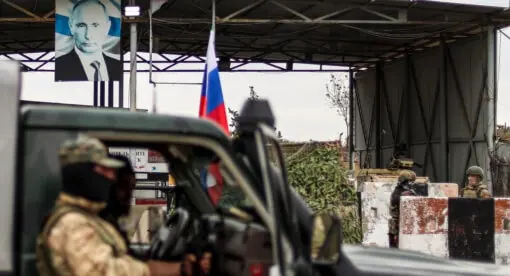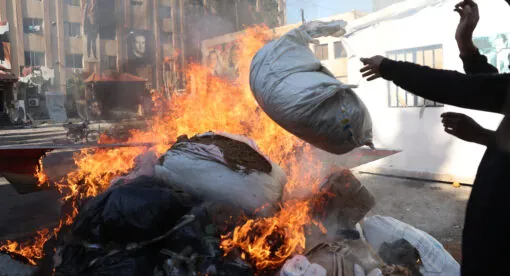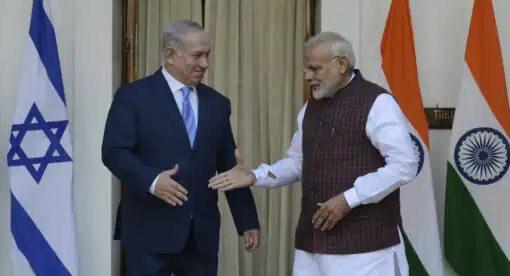In the latest Contours episode, host Carolyn Moorman sits down with Non-Resident Fellow Tanya Domi and Balkans expert Agon Maliqi to discuss how Northern Kosovo reflects the Western Balkans’ political and ethnic instability and how the EU and the U.S. have both undermined the Kosovar-Serbian relationship.
Carolyn Moorman:
Hello and welcome to the latest episode of the Contours podcast by the New Lines Institute for Strategy and Policy. This is your host, Carolyn Moorman, and today we’ll be turning once again to the newly launched Western Balkans Observatory, to follow up with one of the contributors to the recent report titled Western Balkans 2023 Assessment of Internal Challenges and External Threats. In previous episodes, we’ve centered on the Balkans, we’ve touched on the flashpoint of Northern Kosovo. In this episode, we’ll be diving into it further with two guests.
The first is Tanya Domi. She’s an adjunct assistant professor of international and public affairs at Columbia University’s School of International and Public Affairs, and is an affiliate faculty member of The Harriman Institute, where she taught in the Balkan studies program since 2008. Prior to her faculty appointment at Columbia, Tanya served in the US Army for 15 years and later worked as a congressional aide and military policy advisor to the late congressman Frank McCloskey. She also worked internationally for more than a decade on issues related to democratic transitional development, including media development, human rights, and human trafficking. She’s expanded her research to include genocide, conflict-related sexual violence, and prevention of atrocity crimes.
Also joining us is one of the contributors to the reports, Agon Maliqi. He’s a policy analyst, activist, and media writer based in Pristina, Kosovo. He’s the creator and co-founder of Sbunker, an Albanian-language current affairs and ideas blog giving voice to a younger generation of scholars, writers, and activists from the Western Balkans. At Sbunker, Mr. Maliqi also co-led the creation and national expansion of TruAktiv, an alternative critical thinking program in Kosovo targeting young aspiring human rights activists.
He’s a regular contributor to Kosovo’s print media and is a frequent commenter on current affairs on radio and television. Mr. Malaqi has also worked as an independent policy consultant in Kosovo, initially focusing on good governance and human development projects. Due to rising concerns over regional security and democratic backsliding as a troubling new paradigm in Eastern Europe, his most recent work has focused more on issues of political risk and resilience to authoritarianism.
Tanya and Agon, thank you so much for joining me today. Agon, I’d like to start with you and have you brief us on May 2023’s violent attacks in Mitrovica, where we saw Serb nationalists attack NATO peacekeepers. What did you think about these attacks, and what larger questions did they bring up for you about Northern Kosovo?
Agon Maliqi:
Yeah. The paper that I wrote for New Lines focused on that particular episode, but even more recently, we had an even more problematic one in which in the north we had an attempt to start, actually, an armed insurgency sponsored by Serbia, in which a Kosovar policeman was killed. I think those two episodes of violence, first brutal attack against NATO soldiers and then Kosovo police engaging in fighting with insurgency groups, illustrated the point that I’m trying to make in the paper. North Kosovo is sort of the biggest security hotspot in Europe outside of Ukraine. And the reason for that is, when you get to the point of violence, a lot of things are probably going wrong, or you see that as the symptom and you say, “Okay, there’s potential for war here.” But that has been slowly building up to this point. And I think the key dynamics explaining why we came to a point of violence is that there’s a process right now to get to an agreement between Kosovo and Serbia, and actually the agreement was reached by the political leaders.
The problem is with implementation, with how the sides view some of the elements of this, and the north especially. So the issue of association of Serbian majority municipalities and the degree of autonomy that Serbs in Kosovo will enjoy. So the violence is, in a way, a symptom of the sides in a way negotiating through force, I would say, or trying to position themselves better to negotiate. Because North Kosovo is, in a way, it is part of Kosovo. Kosovo has sovereignty over it, but not full effective control over the territory, because it is territorially very close to Serbia, in hilly terrain from where Serbia can very easily apply weapons and control this local Serbian population there. And it has a high majority Serbian population that is very hostile to Kosovo’s independence. So the legitimacy of the state is very low there.
And it has NATO there present, but mostly as a sort of last responder. So NATO is there, but it’s not there to do policing work. So the reason why we are here is because the Serbs withdrew from all institutions as part of this crisis in the dialogue between Kosovo and Serbia, leaving a total vacuum between the local population and the state. So the police there are now all Albanians. It’s a bit of a tense environment, with the local population viewing them in hostile terms. So in a way, I call in the paper the north a territory where nobody’s in control and everybody’s in control. So NATO is there, but they’re not fully in control. The Serbs are there, but they’re not fully in control because the police is Albanian. Albanians are there, but not fully in control. So when you have a situation like that, all sides are trying to poke and try to assert control over the territory, as a way to increase leverage in this silo on how to resolve this politically.
Carolyn Moorman:
Absolutely. And you mentioned in your part of the report as well that since 2015, the EU had been taking steps to integrate informal Serbian institutions in Northern Kosovo into the Kosovar state, but then Serbia withdrew, there’s a power vacuum. Can we look at the events in late May and June that you mentioned as being perpetrated, as we know, by Serbian informal government institutions and say, this integration and implementation has completely failed? Or do you see this as there’s room to grow, and there’s an ability for this to get better, or is this completely failed?
Agon Maliqi:
It looks very bad, to be honest. I don’t see very much avenues for progress at this point with the way the antagonism, the degree it has grown, the ethnic distance, the total lack of any sort of communication between the communities. It is a symptom of the failure of the political dialogue. You mentioned integration that started in 2015. It started to happen because the dialogue had started to materialize at that point. So the Serbs in the north were always hesitant to integrate in Kosovo, but in a way, Belgrade at the time was trying to do some favors to the EU, or at least trying to be nice to the EU. So in a way, it also kind of forced the Serbs in the north to integrate in the courts and in the police, to kind of dismantle the structures, through its political party the Serbian List, which is Belgrade-controlled.
But now the same force that was kind of a force of integrating has become a force of secession, because Belgrade is the one that dictates dynamics, and now it needed the Serbs to get out of the institutions, because it feels that it’s not getting what it wants. So it’s not about the agency of the local Serbs. This is, I think, the key problem. Kosovo Serbs are the party with no agency in this. They are stuck between a Belgrade that wants to dictate to them what they should do, and Belgrade’s interest is not necessarily their interest. Belgrade has other interests in mind. And then they’re also stuck between the Kosovar authorities as well, which I’m somewhat critical of the fact that, while I agree that they should try to fight off Belgrade’s secessionist tendencies, they haven’t done as good a job as possible to reach out and find local actors and voices in the north who are credible, and sort of try to reassert that Kosovo Serb agency, and get Belgrade out of the picture.
Carolyn Moorman:
And on top of this power vacuum and this lack of any actors truly having full control of Northern Kosovo, it’s been also labeled as a hotspot of organized crime. And Tanya, I’m wondering, can we relate this label to this lack of formal institution, or is there more to the story that you can go into?
Tanya Domi:
I think with regard to organized crime in Mitrovica, you have a nexus of Serbian politics, which is led really by Aleksandar Vucic’s Progressive Party, and a nexus of actors that are engaged in corruption. And it’s a gray zone. It’s a gray zone that isn’t as regulated, it doesn’t have as much control over it. And the people that do have control, it’s a nexus of political elites that control local businesses, the ones that exist. And so, people are always motivated by what is in their pocket. And the other thing that I learned by living and working in the Balkans is that there’s no impediment to Serbs and Kosovar criminals working together. And we saw that in Bosnia, like when we finally got license plates put on the cars where you could go anywhere you wanted to go in Bosnia, well then corruption traveled further afield and people cooperate, so because they’re motivated by having money.
I mean, I do think it is a depressed economic zone. It’s not a burgeoning economy there. And so it yields to, “Who’s in control and how can I make money?” And so, even though there might be tensions at the negotiating table, under that table, everybody’s working each other to get what they want in terms of their piece of the pie. And so, that’s the regrettable part. So it’s a gray zone and a political nexus that’s really controlled by Belgrade. And that’s one of the problems that confronts the Kosovar apparatus for law enforcement, because there’s very weak rule of law by the Serbs themselves. And so then that yields to the Kosovar police coming in. And Agon’s already discussed that there’s a lot of tension, and in recent weeks people have been killed because of these tensions. So I think it’s a miracle at this point that there wasn’t a war started after September 24th. I mean, I think it’s remarkable that we haven’t descended into armed conflict, but those dynamics about corruption are intertwined with the nexus of political elites and Belgrade.
Carolyn Moorman:
And if we look at the role of the EU here, it seemed to be a lot more active in the early 2010s. We’ve talked in previous podcasts, Tanya, about how the EU and the US have both taken gigantic steps back. Particularly, the EU was involved in the early 2010s trying to achieve normalization between Belgrade and Pristina, before seemingly kind of going on autopilot, as Agon talks about in his essay. What do you think caused this change? More internal politics of the EU at [inaudible 00:11:01] focuses, I’m thinking about regional migration crisis that the EU was experiencing at that time due to the Arab Spring, and then how has this strategy of the EU, with its credibility in the region?
Tanya Domi:
Well, I think that was the early period, when there was a lot of optimism. And actually, Lady Ashton led the dialogue. She came in, she’s a British politician, and came in to be the negotiator. And I have to say, why that happened was that Barack Obama was President of the United States. He turned to the Brits in the EU and said, “Take this situation in Kosovo, and in return, we want you to lead on that, and I need you to back me on Iran.” So that’s when he initiated his opening towards the Iran negotiations, and that’s when America really stepped back from Kosovo at that point, and turned it over to the EU. So I would say given the events, particularly since 2022, with regard to the dialogue between Serbia and Kosovo, I would say that comments by people in my Balkan Roundtable this past week, and Agon was a commentator on this, there is a general consensus that there’s a complete loss of trust and confidence in these negotiators right now.
And the EU, and quite frankly, I think the US has really dented their reputation in the region. And like I said, it’s a miracle that the situation in Kosovo did not descend into armed conflict. Give some credit, maybe, to prevailing cooler heads here. But I think the EU has demonstrated its lack of capacity and its skill. I mean, the diplomats have definitely fallen down on the job. And of course, Borrell, the Foreign Minister of the EU, his country does not recognize Kosovo. So there’s a lot of lack of confidence. And then, I just will add too, as Agon mentioned, the Serbs stayed out of the elections in Mitrovica, they boycotted. Therefore, all the mayors that were elected for those five municipalities are all Albanians.
There was a lot of violence and threats. The tension was high. And so, Kurti ordered the Kosovo Police to escort these mayors to their offices. And what was the reaction from the international community? Tony Blinken, the Secretary of State of the United States, condemned Kurti’s actions in attempting to protect these individuals who were elected mayor. So that was shocking, and I think it was a really low moment. And the US Ambassador to Kosovo also condemned Kurti for him trying to put people into their office in a safe manner.
I think in general, people are shocked and dismayed, and I think there’s a deep loss of confidence. And I would also say that in 2018, when Emmanuel Macron basically said, “Okay, EU enlargement, we’re going to change the rules in the middle of the game, and I’m going to stop it.” And this was at the end of Angela Merkel’s tenure as chancellor, who at the time was the most powerful politician in Europe. And she did not do that much to advance enlargement, but he put a kibosh on it as a power move. And I think that took all the air out of the region. I mean, everyone was deflated by that move. So the combination of puzzling foreign policy approach to the region and a combination of these recent events that are deeply troubling, I think is leaving everyone with a lot of diminished sense of hope and possibility.
Carolyn Moorman:
So with that rather sobering assessment of how the EU and the US have been interacting with this region, I’d like to end with Agon and head back to the final sentence of your essay in this latest New Lines report, which is, “It is time to treat the root causes and not the symptoms.” And I’d love to hear from you, how do you feel it is the best way for the US and the EU to actually do this, given all of the mistakes that they’ve made in the past, and what Tanya has said is this lack of trust for them. How can they mend bridges in the region with this lack of trust?
Agon Maliqi:
Well, I’ll start with a positive, and something that Tanya also mentioned, in that what happened in September now with the armed insurgency was in a way a positive sign of the fact that the Kosovo police is able to deter, and most likely together with NATO intelligence. So it’s a sign of resilience that Serbia was unsuccessful in trying to do this regional destabilization effort. But I don’t think this is a sustainable moment, as we can see with all the other flashpoints happening globally. Next time around, we have no guarantees that it will be similarly resilient. So what needs to happen is that the current situation in the North is unsustainable. Kosovo side, we cannot also resolve this only with police. The police is absolutely necessary there to deter this kind of attacks, but you need some sort of buy-in from the local population. And to do that, this political process has to work.
So the irony that agreements have been signed, and even Kosovo’s Prime Minister has called them good deals, good agreements. What the West needs to do is to iron out clear guarantees for the side and not focus on punitive measures, because they’re just issuing fines and yellow and red card. They need to provide clear guarantees for Kosovo that if, for example, Kosovo goes ahead, that Kosovo’s international position is unlocked, Kosovo cannot afford to kind push the ball again on this one. We did this in 2008 with the Ahtisaari Plan, and we didn’t get the full entire international recognition. So that’s number one. And the second key thing is this issue of appeasing Vucic. A lot of the problems derive from this, from the fact that the West has treated Vucic with way, way, way, way, way too much consideration as if Serbia was India, Turkey, or some huge geopolitical player without whom the West cannot win global battles, I think, which has managed to make the West look ridiculous.
So I think his time is up. His geopolitical blackmail has to end, and the West has to be really assertive in outlining for Serbia that either he agree to unlocking Kosovo’s international standing or he will no longer be a partner. So I think we’re going to that moment. Next week, we will have a visit by the [inaudible 00:17:38] delegation. I think they will try to do a last push for this in the current constellation because it’s almost the end of the Biden administration. It’s almost the end of the mandate of the EU institutions. If this fails then we’re in uncharted territory with a very unsustainable situation in the north, which my fear is could become a little bit like Northern Ireland, where you have a sporadic tension with the police, attacks on police, and then responses. And that can have very bad spillover effect. So I think it has to avoid that, and really try to focus on getting Kosovo internationally unlocked.
Tanya Domi:
Vucic at the end of the day said, “We will not recognize Kosovo.” He just said it. And all these diplomats were all sitting there saying, “Oh yeah, we’re doing this dialogue and we have the signatures.” But he said, “We will never recognize Kosovo.” And it just so happened. So I was teaching last night and I was having my students read the Serbian Academy of Arts and Sciences memorandum of 1989, which was really the ideology that shaped Serbia and the future, the former Yugoslavia. And that memo said, “The crisis and critical point that threatens the Serbian state is in the destabilization of Yugoslavia. Kosovo is the clearest expression of this.” And remember that Vucic was the spokesman for Mr. Milošević. So I am sorry to say that I do not share that much optimism about where this ends.
Agon Maliqi:
No, if I can just end on that. I also agree that Vucic will try to sabotage this by any means possible. My concern is that we have to put him in a spot for him to say no, so that he then no longer is able to do this blackmail of the West. And yes, he has said they will never recognize, and what this proposal of the West says is, they want the fact of recognition, which means the agreement basically says Serbia will not prevent Kosovo joining international organizations. This allows Kosovo to unlock internationally. Then Serbia’s recognition will not matter, in a practical way. I think in that sense, this is the only way this could work, but I don’t think Vucic which will even agree to that. I think he’s just been bluffing all the time. I think it’s just a matter of calling off that bluff and just ending this geopolitical blackmail.
Carolyn Moorman:
And all of this, of course, only makes the work of the Western Balkans Observatory more critical on this subject, on this region. I thank both of you so much for coming on the podcast to discuss this. To our listeners, Please stay tuned for future Contours episodes, on all of the streaming platforms that you use to listen to podcasts. You can also check out further geopolitical analysis on www.newlinesinstitute.org. All the best.







